Water, Environmental, and Energy Solutions (WEES)
The Water, Environmental and Energy Solutions (WEES) initiative invests TRIF dollars in cutting-edge research, cross-campus collaborations, and innovative partnerships that promote fresh ideas, technologies, and effective resource management practices. TRIF-WEES-funded initiatives at the UA bring an average 8:1 return on investment and impact the education of more than 400 students each year. These funds create centers, support and catalyze research, enable students, and facilitate the transfer of information from the University to the public in myriad ways.
Cross-campus collaboration is one of the pillars of the TRIF-WEES mission. Innovative ideas do not originate in isolation, they take a community of knowledge and skill sets to come to fruition. Our goal at WEES is to enhance the grant competitiveness and creativity of the research by promoting a diverse and strong community. WEES sees itself at the center of the large community of researchers here at the University of Arizona in the fields of water, energy and the environment and is working hard to bring these researchers together.
TRIF-WEES funds projects in the following five areas, as well as Fostering Leaders in Resilience.
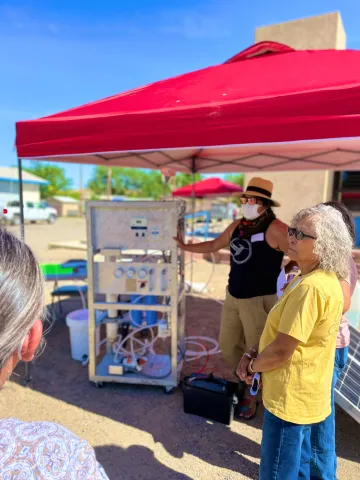
Shiprock Sustainability Fair conversations centered around Navajo farmers’ desire to grow more food locally and interest in greenhouses to supplement
traditional agriculture. Off-grid water units would allow Diné citizens who have the desire to move back to ancestral homelands.
IRes
For humans to continue to live in arid lands, we must understand how we can be resilient to impacts associated with climate change and other stresses affecting the linked human and natural systems of the desert. Many changes that will eventually affect the rest of the world are starting here in the arid Sonoran Desert; our experiences can inform communities across the globe. Integrated research, education, and outreach grounded in community needs is necessary to guide actions, policies, and decisions that preserve and enhance these linked cultural and ecological systems.
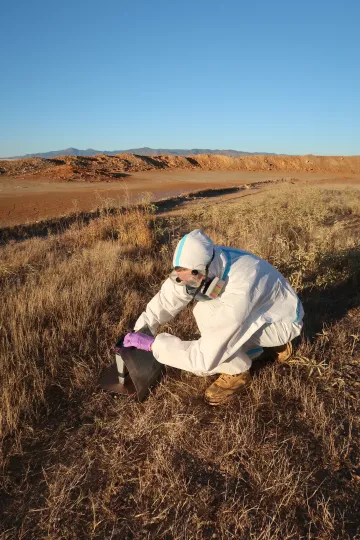
PhD student Tomasz Wlodarczyk screening vegetation to identify potential metal hyperaccumulators at a legacy mine site in Arizona
using an x-ray fluorescence analyzer.
Kamila Murawska-Wlodarczyk
Arizona’s changing climate, population, demographics, and land use patterns, as well as sudden shocks to the system from pandemics, heat waves, wildfires, and other natural phenomena, bring a continuous stream of health challenges to our communities. As people are moving closer to the urban/wild interface, changing climate brings new or more intense natural hazards and new vectors for disease transmission into our region. Communities need reliable information about the nature and extent of threats, the economic costs of threats and possible counter actions, where the greatest vulnerabilities lie, and scenarios for building resiliency to their effects. Furthermore, resource use and extraction industries are critical to the Arizona economy, but have impacts on environmental and human health that need to be addressed.
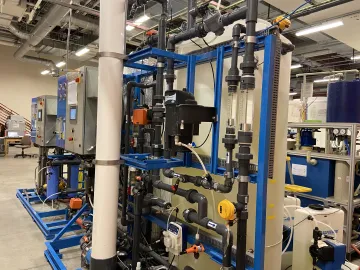
A reverse osmosis (RO) skid system in operation at WEST Center used to evaluate the performance of new viral indicators as part of an ongoing project and previous research work conducted by a Ph.D. student.
WEST Center
We seek reliable supplies of clean water for our municipalities, industries, and ecosystems, including new technologies to treat contaminated water, new means to use water more efficiently, and better methods to distribute it equitably. The science and technology of clean and reliable water is extremely important, as is having people understand the options and trade-offs associated with alternative pathways forward and encouraging the exploration of creative new ways to manage water in the state.
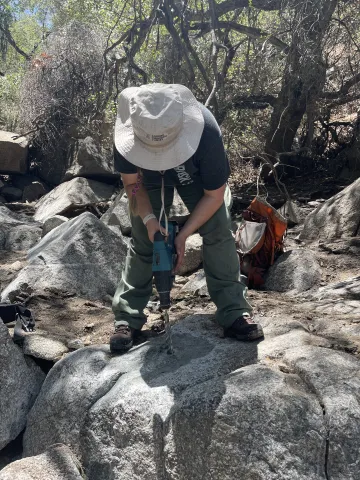
Rebecca Beers installs a pressure transducer to monitor post-fire floodwaters in a stream channel.
Luke McGuire
We can better prepare for change if we are able to monitor it in real time. Data related to weather, water resources, soil and vegetation conditions, air quality, greenhouse gasses, wind and solar energy, and other conditions allows us to predict what we might expect in the future and plan accordingly. Scientists are now developing methods to provide data and forecasts at shorter-term and more local scales useful to farmers, utilities, and resource managers. A critical step is collaboration between data collectors, data modelers, and data users to ensure that the quality, format, and parameters of the data products are optimized to users’ needs.
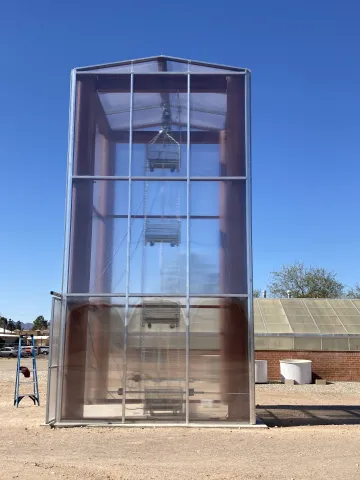
Solar tower to dry and repurpose food waste on a large scale.
Goggy Davidowitz
As energy demands, food scarcity, and climate variability increase, the means to create and maintain reliable and resilient energy delivery systems, and food production systems sufficient to sustain and enhance our society, economy, and ecosystems are of paramount importance, especially in regions like Arizona and the Southwest. An integrated and aggressive approach that incorporates economic considerations is required to solve these problems, especially as this region is home to many communities that are particularly vulnerable to such changes.

